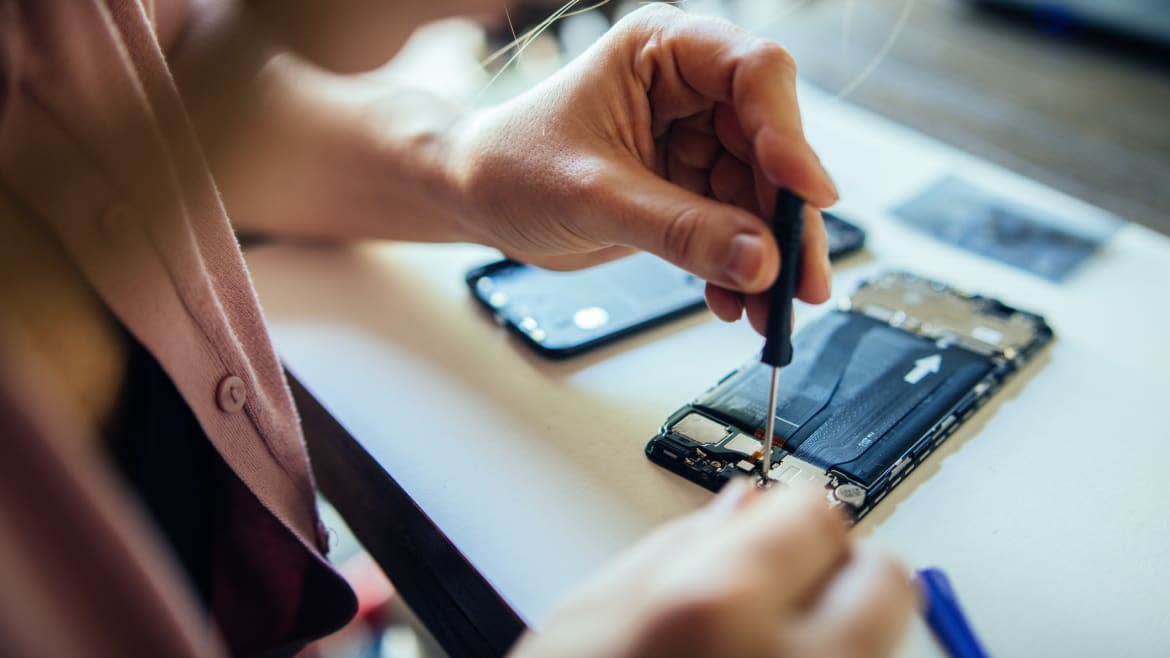New York’s Right-to-Repair Bill Is ‘Functionally Useless,’ Critics Say

We’ve all been there: Maybe you dropped your phone one too many times and now the screen is cracked. Or maybe it was in your pocket when you accidentally ran into a turnstile trying to catch a train and it completely bent. (Editor’s note: I feel attacked.) Or maybe you did nothing wrong—but your phone won’t power despite being on the charger all day.
No matter the situation, you need to get it fixed—but unfortunately, that’s a lot easier said than done. If you have something like an iPhone, you can’t often just do it yourself. Hell, sometimes you can’t even take it to any old tech repair person. You’ll need to take it to the Apple Store or an Apple certified repair shop to fix it for you. You have incredibly limited options—which also means that they can charge pretty much whatever they want to repair your busted phone.
This is exactly the issue the right-to-repair movement seeks to change. While advocacy groups have tried to push regulation to give consumers the ability to fix their own tech products themselves for years, little has actually changed in terms of concrete legislation—until yesterday… kind of.
On Dec. 28, New York governor Katy Hochul signed the Digital Fair Repair Act, the first right-to-repair bill passed by a state legislature. The law requires companies that sell “digital electronic equipment” to provide consumers and repair businesses access to instructions, parts, and tools to fix and upgrade those products.
New: Gov. Hochul has signed the “right to repair” law — with the Legislature agreeing to a number of changes, as outlined in her approval message. pic.twitter.com/GUBExlj5BD
— Jon Campbell (@JonCampbellNY) December 29, 2022
“This legislation would enhance consumer options in the repair markets by granting them greater access to the parts, tools and documents needed for repairs,” Hochul wrote in a statement. “Encouraging consumers to maximize the lifespan of their devices through repairs is a laudable goal to save money and reduce electronic waste.”
“New York leads the nation again. Today, the United States’ first right to repair bill, the Digital Fair Repair Act, was signed into law—putting consumers first, leveling the playing field for independent repair shops, and reducing our e-waste footprint on the environment,” Patricia Fahy of Albany, an NY state representative and co-sponsor of the bill, said in a statement.
While it has been hailed as “groundbreaking” by some right-to-repair activists, there are a few notable changes from the original bill introduced by tech lobbyists representing the likes of Microsoft, Google, Amazon, and Apple and pushed by Gov. Hochul that essentially defang the legislation.
Judge Jeanine After Bashing Apple: Tossing iPhone ‘Not the Answer’
For one, original equipment manufacturers (OEM) aren’t required to “provide to the public any passwords, security codes or materials to override security features,” Hochul wrote. That means if you get locked out of a device, you won’t be able to access it without a factory reset or sending it to the OEM.
Also, OEMs are allowed to send “assemblies of parts” instead of individual parts if “the risk of improper installation heightens the risk of injury.” Confused? You’re not alone. The language seems intentionally vague and opaque. But it essentially says that if you need to repair or replace a specific component of your device like an iPhone screen ($), an OEM like Apple can sell you a bundle of different parts ($$$) instead.
On top of all that, the bill only applies to devices made and sold in New York on and after July 1, 2023. That means it won’t apply to the cell phone or computer you’re reading this on that, you know, might break down and need to be repaired in the future.
Louis Rossmann, a right-to-repair activist who helped push the original version of the bill to pass the NY legislature, lambasted the bill signed by Hochul in a YouTube video saying that, “It got fucked in the exact manner that I thought it would.” He later added that the bill was “watered down” to the point where it was “functionally useless.”
Bill That Would Ban Puppy Sales in New York Pet Stores Awaits Guv’s Signature
But many right-to-repair advocates see the bill as a step forward—albeit a small one—for the movement to give consumers more choices with their products.
“This is a huge victory for consumers and a major step forward for the right to repair movement. New York has set a precedent for other states to follow, and I hope to see more states passing similar legislation in the near future,” Kyle Wiens, CEO of right-to-repair group iFixit, said in a statement.
The movement has been bolstered in recent years by other legislative efforts including a 2021 executive order signed by President Joe Biden that told the FTC to ban “anticompetitive restrictions on using independent repair shops or doing DIY repairs of your own devices and equipment.”
So in all it’s a mixed bag for the right-to-repair movement. While the bill might be a lot less aggressive than advocates would hope for, it’s a sign that the days of needing to send your phone, laptop, or even tractor to a licensed dealer or repair shop are going extinct. Hopefully, future legislation will put a permanent fix on a truly broken tech system.
Got a tip? Send it to The Daily Beast here
Get the Daily Beast's biggest scoops and scandals delivered right to your inbox. Sign up now.
Stay informed and gain unlimited access to the Daily Beast's unmatched reporting. Subscribe now.

